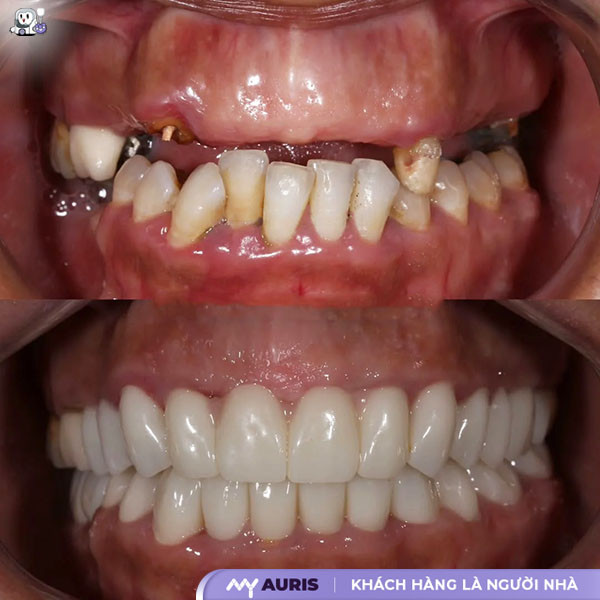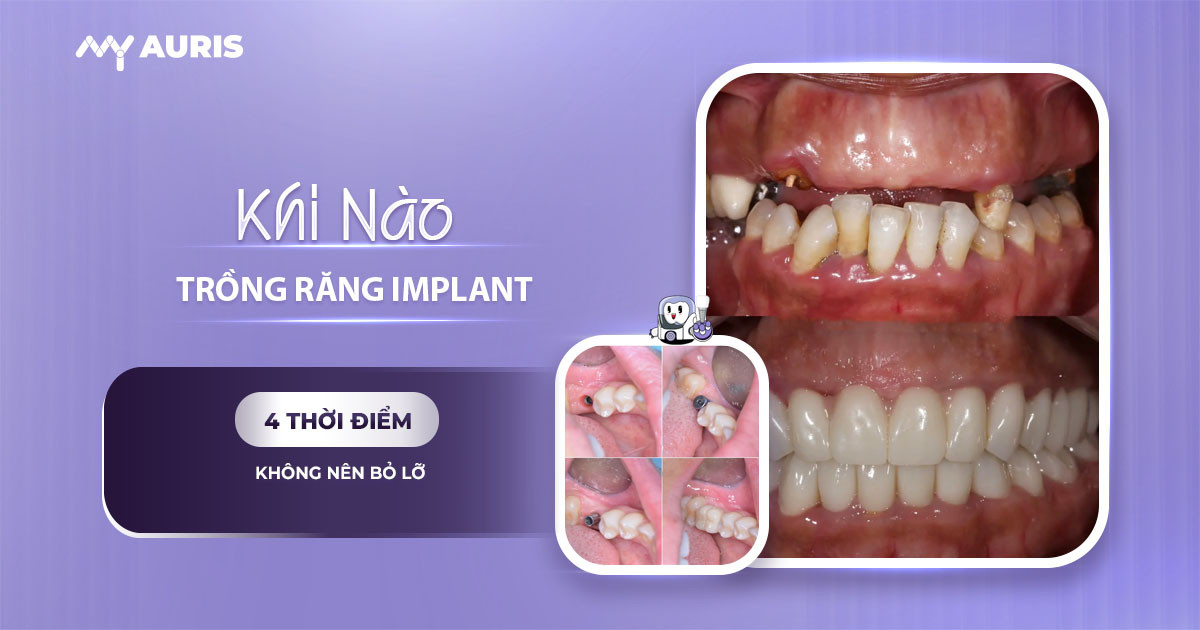When should dental implants be placed for the best results? According to dentists, there are 3 suitable times: immediate implant placement after tooth extraction, early implant placement after 1–3 months, or delayed implant placement after 3 months. Each stage has its own advantages and disadvantages, requiring an assessment of bone condition and overall health. This article by My Auris will help you understand the best time for dental implant placement to achieve the highest effectiveness, avoid complications, and save long-term costs.
What is a dental implant and who is it suitable for?
Dental implant placement is a method of inserting a titanium post into the jawbone to replace a missing tooth root. Subsequently, a porcelain crown is attached to this post to form a complete artificial tooth. Dental implants are highly durable; with proper care, they can last over 20 years or even a lifetime. This is a fixed tooth restoration solution, eliminating the need to grind down adjacent teeth like with bridges and avoiding removable dentures.
Implants not only restore chewing function almost like natural teeth but also limit jawbone resorption and improve facial aesthetics. Cone Beam CT technology, personalized treatment planning software systems, and modern post materials (such as pure titanium) help increase the success rate to 98%.
Not everyone who loses a tooth is eligible for implant placement. Several factors need to be carefully evaluated before proceeding:
Adults, ≥18 years old
Stable jawbone development is an essential condition. Placing implants too early can affect long-term results.
In good general health
Patients should not have uncontrolled diabetes, be undergoing cancer treatment, or have blood clotting disorders. These factors can affect bone integration and soft tissue healing.
Sufficient jawbone volume and density (D1 – D3)
If a tooth has been missing for a long time, the alveolar bone may resorb. In this case, bone grafting may be required before implant placement. The dentist will take digital X-rays to assess the specific condition.
Non-smoker or willing to quit before and after surgery
Cigarette smoke severely impacts the process of implant osseointegration with the bone.
Desire for durable and highly aesthetic tooth restoration
Individuals who want to restore natural chewing function, prefer not to use removable dentures, and desire a long-lasting solution.

When should dental implants be placed after tooth loss?
According to recommendations from implant specialists, there are 3 suitable times to consider dental implant placement:
Immediate implant placement: Applied immediately after tooth extraction if the alveolar bone has sufficient volume and is not infected. This method helps shorten treatment time and reduce bone resorption. However, not everyone meets the health conditions for this procedure.
Early implant placement (1 – 3 months after tooth extraction): This is an ideal time for dental implant placement because the soft tissues have healed, and bone resorption has not significantly occurred. The dentist can accurately assess bone quality and create a personalized treatment plan.
Delayed implant placement (>3 months): Only applied when the patient does not meet early conditions, however, the risk of bone grafting and sinus lift will be higher, increasing costs and extending recovery time.
Specifically, the recommended age for dental implant placement is 18 years or older, when the jawbone has developed stably. Elderly individuals can still receive implants if they are in stable health, do not have uncontrolled diabetes, or other contraindicating medical conditions.

Cases where implant placement is not recommended or should be delayed
Not everyone can receive dental implants immediately after tooth loss. While this is a modern and durable dental restoration method, some special cases require careful consideration or delay to avoid complications.
Patients with uncontrolled systemic diseases such as diabetes, cardiovascular disease, high blood pressure, or blood clotting disorders should temporarily postpone implant placement. These conditions directly affect tissue healing capabilities and the degree of osseointegration of the implant post. In such situations, the implant specialist will require stabilization of the underlying medical condition before proceeding with implant surgery.
Individuals with very low jawbone density or severe jawbone resorption also fall into the group that needs to delay implant placement. The implant post requires sufficient alveolar bone volume and quality for stabilization. If the bone is weak or thin, the risk of titanium post rejection will be higher. In this case, the dentist may recommend bone grafting before implant placement. This is a mandatory step for safe and long-lasting chewing function restoration.
Regular smokers should temporarily stop smoking before and after implant placement. Nicotine affects healing capabilities, reduces blood flow to the tissues around the teeth, and slows down the biological integration process between the bone and the implant post. If this habit is not abandoned, the implant failure rate will increase significantly.
Individuals under 18 years old are not eligible for implant placement because their jawbones have not yet fully developed. Early intervention can cause occlusal discrepancies or prevent the implant from keeping pace with bone development. In this case, the dentist will recommend temporary removable dentures or a dental bridge until they reach adulthood.
Certain acute inflammatory conditions such as gingivitis, periodontitis, or damaged soft tissues are also reasons to delay. Healthy, non-inflamed soft tissues around the tooth are essential to ensure a safe dental implant placement procedure. Soft tissue restoration is a mandatory step to reduce the risk of peri-implantitis after surgery.
Furthermore, individuals with psychological factors such as fear of surgery or those not financially ready should consult thoroughly with their dentist. Dental implant placement is a dental treatment procedure that requires a clear plan, accurate digital X-ray imaging, a personalized treatment protocol, and serious psychological preparation from the patient.
Immediate implant placement or how long to wait after tooth extraction?
When a tooth is lost, many wonder whether to place a dental implant immediately or wait for a period. The answer depends on several factors: jawbone condition, soft tissues around the tooth, implantation technique, and the personalized treatment plan from the implant specialist.
Immediate dental implant placement after tooth extraction – when is it the right choice?
If the soft tissues are not inflamed and the jawbone has sufficient volume and density (D1–D3), the patient may be indicated for immediate implant placement right after extraction. This approach helps save treatment time, limits alveolar bone resorption, and shortens recovery time.
Immediate implant placement typically takes about 30 – 60 minutes, depending on the location and number of implants. Although modern techniques make the process less painful, it still requires time for the implant to osseointegrate with the bone, usually from 2 – 6 months.

Delayed implant placement – a safe option when risks are present
In many cases, delayed implant placement 1 – 3 months after tooth extraction is a safe and preferred option. This period allows soft tissues and alveolar bone to stabilize, reduces inflammation, and creates better conditions for more effective implant osseointegration.
This method is suitable for individuals with mild bone loss, those who need recovery time, or those undergoing treatment for underlying medical conditions. When delayed, the dentist can create a detailed, personalized oral restoration plan for each step based on the jawbone condition, bone density, and the location of the missing tooth.
In cases of significant bone loss, the dentist may recommend bone grafting before implant placement. The waiting period for bone grafting usually lasts 3 – 6 months, after which the implant can be placed. Although this takes more time, it ensures the stability and durability of the implant post.
Dentist’s advice: How do you know it’s time for dental implant placement?
According to implant specialists, the timing of implant placement significantly determines the effectiveness of oral restoration, the ability of the implant post to integrate with the jawbone, and the overall treatment cost.
Based on imaging results and oral health, the dentist will determine if you are eligible for immediate implant placement or if preliminary supportive interventions (bone grafting, sinus lift, etc.) are needed.
In most cases, if you are under 70 years old, in stable health, and do not suffer from uncontrolled chronic diseases such as diabetes or high blood pressure, dental implant placement is feasible. The ideal age is 18 years or older, when the jawbone has developed stably.
The treatment plan is personalized for each patient. If the alveolar bone has sufficient volume, you can undergo immediate implant placement after tooth extraction or within 1–3 months. Conversely, if there has been significant bone loss, the treatment time may extend up to 6 months after bone grafting.
It is crucial not to wait until complications arise before seeking examination. Immediately after tooth loss, proactively visit a reputable dental facility for consultation and to establish a treatment plan. Timely implant placement not only helps maintain nearly natural chewing function but also saves costs by avoiding complex interventions later on.





